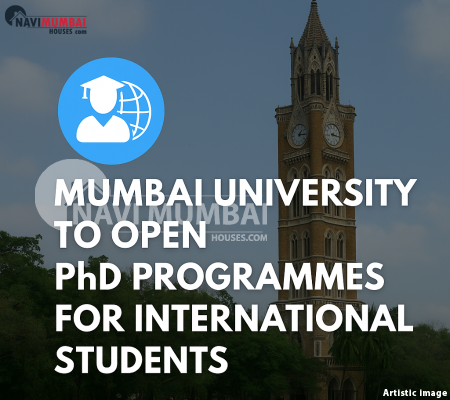
1. Before: The Status Quo
Until now, Mumbai University’s PhD programmes were largely restricted to Indian nationals or students with Indian qualifications. Foreign students faced considerable hurdles — equivalency of prior degrees, regulatory permissions, visas, funding constraints, and administrative bottlenecks.
Many international students seeking to study in India chose IITs, IISERs, or university departments with more global visibility. The lack of explicit openness by MU was a limiting factor in its global footprint and research collaborations.
2. Change: Opening PhD to International Students
According to recent reports, the University of Mumbai is preparing to open its PhD programmes to international students.
Key details available or expected:
-
The policy is expected to start in the upcoming admissions cycles.
-
International applicants will need to satisfy the equivalence of prior degrees/credentials, as per India’s academic regulations.
-
Their admissions will likely follow the same entrance processes (written tests, interviews) as domestic PhD candidates.
-
Funding, fellowships, and support structures will need to be adapted for foreign students (stipends, accommodation, visa support).
This shift is part of Mumbai University’s push to internationalize its research profile, attract global talent, and increase academic collaboration across borders.
3. Impacts & Benefits
For Mumbai University
-
Enhanced research output & visibility: International students bring diverse perspectives, cross-cultural research, and comparative studies, boosting global ranking and citation impact.
-
Stronger collaborations: Easier ease in forming joint projects, funding proposals, and exchange programmes with foreign universities.
-
Better resource utilization: Faculty, labs, and infrastructure can be more fully leveraged with a broader student base.
-
Global branding: It positions MU as a destination for global scholars, attracting attention, partnerships, and possibly funding.
For Students (Domestic & International)
-
International exposure within India: Global students in India enrich the intellectual environment and foster cross-cultural exchanges.
-
More competitive peer group: Domestic students will benefit from stronger competition and learning from diverse cohorts.
-
Opportunity for foreign scholars: Those interested in Indian subjects — regional studies, environment, social sciences, etc. — now have a direct path into MU’s research programmes.
For the Indian Academia / Research Ecosystem
-
Encourages brain circulation (rather than brain drain).
-
Increases collaboration, joint publications, and global project bids.
-
Sets a precedent for other universities to open up to foreign PhD talent.
4. Challenges & Things MU Must Address
This is a welcome step, but success depends on managing several key challenges:
-
Degree & credential equivalence
International students’ prior qualifications (from diverse systems) must be vetted carefully and fairly. -
Funding & stipend parity
Ensuring foreign PhD students have equivalent financial support (stipend, travel allowance, fellowship) to remain competitive. -
Visa & immigration facilitation
Universities must help students with visa processes, regulatory clearances, and extension policies. -
Language / academic adaptation
Some courses or exams may use local languages (Hindi, Marathi) or Indian systems — bridging language or procedural differences matters. -
Infrastructure & accommodation
Sufficient housing, labs, research facilities, and services must be reserved for increased international student load. -
Administrative readiness & policy clarity
Clear guidelines, streamlined workflows, grievance redress, and academic support must be in place before launch. -
Retention & integration
Integration of international scholars socially, culturally, and academically is important to prevent isolation or dropouts.
5. What To Watch / Recommendations
-
When inside announcements or university circulars are released, they detail eligibility, admission timelines, and quotas.
-
How many seats/quotas are reserved for foreign PhD candidates — will they be limited or substantial?
-
What stipends/fellowships will be offered to foreign scholars, and whether they match domestic ones.
-
Collaboration with foreign universities to attract joint supervision or co-guidance models.
-
Student outreach globally — whether MU markets this opportunity internationally (websites, fairs, partner institutions).
-
Feedback from first cohorts — challenges faced, dropouts, and academic outcomes.
Conclusion
Mumbai University’s decision to open its PhD programmes to international students is a timely, forward-looking move. It strengthens MU’s academic stature, bridges cross-cultural research, and aligns with India’s ambition to become a global knowledge hub.
But the real test will lie in implementation — fairness in admissions, sufficient funding, administrative readiness, and institutional willingness to support foreign scholars. If done well, this policy could reshape MU’s campus, its research output, and its global academic network.
Visit Us: Navimumbaihouses.com or Call Us @ 8433959100
The post Mumbai University Embraces Global Talent with PhD Intake for Foreigners appeared first on .

